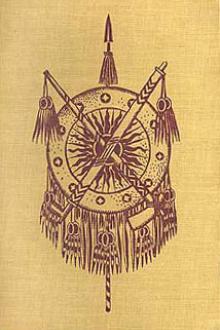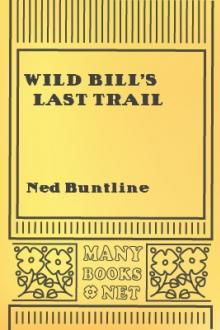The Hidden Children, Robert W. Chambers [e book reader free .txt] 📗

- Author: Robert W. Chambers
Book online «The Hidden Children, Robert W. Chambers [e book reader free .txt] 📗». Author Robert W. Chambers
I talked for a while with Mrs. Bleecker of this and that, striving the while to catch Lana Helmer's eye. For not only did her coquetry with Boyd make me uneasy, knowing them both as I did, but on my own account I desired to speak to her in private when opportunity afforded. Alone and singly either of these people stood in no danger from the outer world. Pitted against each other, what their recklessness might lead to I did not know. For since Boyd's attempted gallantries toward Lois—he believing her to be as youthful and depraved as seemed the case—a deep and growing distrust for this man which I had never before felt had steadily invaded my friendship for him. Also, he had already an affair with a handsome wench at the Middle Fort, one Dolly Glenn, and the poor young thing was plainly mad about him.
I heard Mrs. Lansing propose a stroll to the river before dinner, on the chance of meeting her husband's regiment returning, which suggestion seemed to suit all; and in the confusion of chatter and laughter and the tying of a sun-mask by Mrs. Bleecker, aided by Boyd and by the exquisite courtier, I cleverly contrived to supplant Boyd with Lana Helmer, and not only stuck to her side, but managed to secure the rear of the strolling column.
All this manoeuvre did not escape her, and as we fell a few paces behind, she looked up at me with a most deadly challenge in her violet eyes.
"Now," she said, "that you have driven off your rival, I am resigned to be courted.... Heaven knows you wasted opportunities enough at Guy Park."
I laughed.
"How strange it is, Lana," I said, "to be here with you; I in rifle dress and thrums, hatchet, and knife at my Mohawk girdle; you in chip hat and ribbons and dainty gown, lifting your French petticoat over the muddy ruts cut on the King's Highway by rebel artillery!"
"Who would have dreamed it three years ago?" she said, her face now sober enough.
"I thought your people were Tory," said I.
"Not mine, Euan; Clarissa's."
"Where is that child?" I asked pityingly.
"Clarissa? Poor lamb—she's in Albany still."
I did not speak, but it was as though she divined my unasked question.
"Aye, she is in love with him yet. I never could understand how that could be after he married Polly Watts. But she has not changed.... And that beast, Sir John, installed her in the Albany house."
I said: "He's somewhere out yonder with the marauders against whom we are to march. They're all awaiting us, it is said; the whole crew—Johnson's Greens, Butler's Rangers, McDonald's painted Tories, Brant's Mohawks—and the Senecas with their war-chiefs and their sorcerer, Amochol—truly a motley devil's brood, Lana; and I pray only that one of Morgan's men may sight Walter Butler or Sir John over his rifle's end."
"To think," she murmured, "that you and I have dined and wined with these same gentlemen you now so ardently desire to slay.... And young Walter Butler, too! I saw his mother and his sister in Albany a week ago—two sad and pitiable women, Euan, for every furtive glance cast after them seemed to shout aloud the infamy of their son and brother, the Murderer of Cherry Valley."
"To my mind," said I, "he is not sane at all, but gone stark blood-mad. Heaven! How impossible it seems that this young man with his handsome face and figure, his dreamy melancholy, his charming voice and manners, his skill in verse and music, can be this same Walter Butler whose name is cursed wherever righteousness and honour exist in human breasts. Why, even Joseph Brant has spurned him, they say, since Cherry Valley! Even his own father stood aghast before such infamy. Old John Butler, when he heard the news, dashed his hands to his temples, groaning out: 'I would have crawled from this place to Cherry Valley on my hands and knees to save those people; and why my son did not spare them, God only knows.'"
Lana shook her pretty head.
"I can not seem to believe it of him even yet. I try to think of Walter as a murderer of little children, and it is not possible. Why, it seems but yesterday that I stood plaguing him on the stone doorstep at Guy Park—calling him Walter Ninny and Walter Noodle to vex him. You remember, Euan, that his full name is Walter N. Butler, and that he never would tell us what the N. stands for, but we guessed it stood for Nellis, in honour of Nellis Fonda.... Lord! What a world o' trouble for us all in these three years!"
"I had supposed you married long ago, Lana. The young Patroon was very ardent."
"I? The sorry supposition! I marry—in the face of the sad and miserable examples all my friends afford me! Not I, Euan, unless——" She smiled at me with pretty malice. "——you enter the lists. Do you then enter?" I reddened and laughed, and she, always enchanted to plague and provoke me, began her art forthwith, first innocently slipping her arm through mine, as though to support her flagging steps, then, as if by accident, letting one light finger slip along my sleeve to touch my hand and linger lightly.
Years ago, when we were but seventeen, she had delighted to tease and embarrass me with her sweetly malicious coquetry, ever on the watch to observe my features redden. I remember she sometimes offered to exchange kisses with me; but I was a ninny, and a serious and hopeless one at that, and would have none of her.
I believe we were thinking of the same thing now, and when I caught her eye the gay malice of it was not to be mistaken.
"Lanette," said I, "take care! I am a soldier since you had your saucy way with me. You know that the military are not to be dealt with lightly. And I am grown up in these three years."
"Grown soberer, perhaps. You always did conduct like a pious Broad-brim, Euan."
"I've a mind to kiss you now," said I, vexed.
"Kiss away, kind sir. You have me in the rear of them. Now's your opportunity!"
"Doubtless you'd cry out."
"Doubtless I wouldn't."
"Wait for some moonlit evening when we're unobserved——"
"Broad-brim!"
I laughed, and so did she, saying:
"I warrant you that your pretty Lieutenant Boyd had never waited for my challenge twice!"
"Best look out for Boyd," said I. "He's of your own careless, reckless kind, Lanette. Sparks fly when flint and steel encounter."
"Cold sparks, friend Broad-brim!"
"Not too cold to set tinder afire."
"Am I then tinder? You should know me better."
"In every one of us," said I, "there is an element which, when it meets its fellow in another, unites with it, turning instantly to fire and burning to the very soul."
"How wise have you become in alchemy and metaphysics!" she exclaimed in mock admiration.
"Oh, I am not wise in anything, and you know it, Lana."
"I don't know it. You've been wise enough to keep clear of me, if that be truly wisdom. Come, Euan, what do you think? Do you and I contain these fellow elements, that you seem to dread our mutual conflagration if you kiss me?"
"You know me better."
"Do I? No, I don't. Young sir, caper not too confidently in your coat of many colours! If you flout me once too often I may go after you, as a Mohawk follows a scalp too often flaunted by the head that wears it!"
I tried to sustain her delighted gaze and reddened, and the impudent little beauty laughed and clung to my arm in a very ecstasy of malice, made breathless by her own mirth.
"Come, court me prettily, Euan. It is my due after all these grey and Quaker years when I made eyes at you from the age of twelve, and won only a scowl or two for my condescension."
But we had reached the river bank, and there the group came once more together, the ladies curious to see the batteaux arriving, loaded with valley sheep, we officers pointing out to them the canoes of our corps of Oneida guides, and Hanierri and the Reverend Mr. Kirkland reading their Testaments under the shade of the trees, gravely absorbed in God.
"A good man," said I, "and brave. But his honest Stockbridge Indians know no more of Catharines-town than do the converted Oneidas yonder."
Boyd nodded: "I prophesy they quit us one and all within an arrow-flight of Wyalusing. Do you take me, Loskiel?"
"No, you are right," I said. "The fear of the Long House chains them, and their long servitude has worn like fetters to their very bones. Redcoats they can face, and have done so gallantly. But there is in them a fear of the Five Nations past all understanding of a white man."
I spoke to a diminished audience, for already Boyd and Lana Helmer had strolled a little way together, clearly much interested in each other's conversation. Presently our precious senior Consign sauntered the other way with pretty Mistress Lansing on his arm. As for me, I was contented to see them go—had been only waiting for it. And what I had thought I might venture to say to Lana Helmer by warrant of old acquaintance, I was now glad that I had not said at all—the years having in no wise subdued the mischief in her, nor her custom of plaguing me. And how much she had ever really meant I could not truly guess. No, it had been anything but wise to speak to her of Lois. But now I meant to mention Lois to Mrs. Bleecker.
We had seated ourselves on the sun-crisped Indian grass, and for a while I let her chatter of Guy Park and our pleasant acquaintance there, and of Albany, too, where we had met sometimes at the Ten Broecks, the Schuylers, and the Patroons. And all the while I was debating within my mind how this proud and handsome, newly-married girl might receive my halting story. For it would not do to conceal anything vital to the case. Her clear, wise eyes would see instantly through any evasion, not to say deception—even a harmless deception. No; if she were to be of any aid in this deeply-perplexing business, I must tell her the story of Lois—not betraying anything that the girl might shrink from having others know, but stating her case and her condition as briefly and as honestly as I might.
And no sooner did I come to this conclusion than I spoke; and after the first word or two Mrs. Bleecker put off her sun-mask and turned, looking me directly in the eyes.
I said that the young lady's name was Lois de Contrecoeur—and if it were not that it was nothing, and human creatures require a name! But this I did not say to her, nor thought it necessary to mention any doubt as to the girl's parentage, only to say she was the child of captives taken by the Senecas after the Lake George rout.
I told of her dreary girlhood, saying merely that her foster parents were now dead and that the child had conceived the senseless project of penetrating to Catharines-town, where she believed her mother, at least, was still held captive.
The tall, handsome girl beside me listened without a word, her intent gaze never leaving me; and when I had done, and the last word in my brief for Lois had been uttered, she bent her head in thought, and so continued minute after minute while I sat there waiting.
At last she looked up at me again, suddenly, as though to surprise my secret reflections; and if she did so I do not know, for she smiled and held out her hand to me with so pretty a confidence that my lips trembled as I pressed them to her fingers. And now something within her seemed to have been reassured, for her eyes and her lips became faintly humorous.
"And where is this most forlorn and errant damsel, Sir Euan?" she inquired. "For if I doubt her when I see her, no more than I doubt you when I look at you, something should be done in her behalf without delay.... The poor, unhappy child! And what a little fool! The Lord looks after his lambs, surely, surely—drat the little hussy! It mads me to even think of her danger. Did a body ever hear the like of it! A-gypsying all alone—loitering around this army's camp! Mercy! And what a little minx it is to so conduct—what with our godless, cursing headlong soldiery, and the loud, swaggering forest-runners! Lord! But it chills me to the bone! The silly, saucy baggage!"
She shuddered there in the hot sunshine, then shot at





Comments (0)